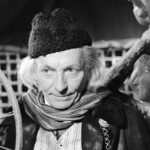(Contains spoilers for Series 11 and 12 of Doctor Who)
“Maybe I’m nervous. Or just socially awkward. I’m still figuring myself out.” For many, these words might echo personal experiences with social anxiety or navigating the complexities of self-discovery. But for fans of Doctor Who, this quote is instantly recognizable as coming from the Thirteenth Doctor, an incarnation that has sparked significant discussion, particularly within the autistic community. Many viewers, including myself, deeply connect with the idea of the 13th Doctor as an autistic character, finding a wealth of relatable traits in her portrayal.
Like many individuals on the autism spectrum, the Thirteenth Doctor exhibits intense enthusiasm for her interests, often finding joy in details that might seem mundane to neurotypical (NT) individuals. Her delight in a laminator, her fondness for biscuits, and her uncontainable excitement for scientific projects – even when those projects are undertaken by individuals with questionable motives – all paint a picture of passionate focus. Then there’s the charming “purple sofa” scene. For those who have experienced the milestone of gaining their own space, the Doctor’s joyful musings about wanting her own flat and a purple sofa to relax on are incredibly relatable. It’s a moment of attempted small talk that, while perceived as slightly unusual by her companions, perfectly captures the nuances of social interaction for someone who might process social cues differently.
This “purple sofa” moment is far from an isolated instance. The Thirteenth Doctor explicitly acknowledges her social awkwardness on multiple occasions, a refreshing and validating admission for viewers who share similar experiences. The search for female characters who are allowed to be eccentric, who can express unbridled enthusiasm, and who can openly admit to social uncertainties is a constant one. Crucially, the Thirteenth Doctor’s eccentricity and social awkwardness are never presented as flaws requiring correction. This portrayal is incredibly important, reinforcing the idea that neurodiversity is a natural variation of human experience, not something to be “fixed”.
Another aspect of the Thirteenth Doctor that resonates with autistic viewers is her apparent disregard for traditional gender roles. Regenerating into a female body after centuries of male incarnations seems to be of little consequence to her. She rarely focuses on her gender, often appearing to forget about it entirely unless confronted with overt sexism. This nonchalant attitude towards gender expectations can be particularly appealing to those who feel they exist outside of societal norms and rigid categorizations.
The Thirteenth Doctor possesses a deep well of empathy, although her expression of it can sometimes differ from neurotypical expectations. When her companion Graham confides in her about his fear of his cancer returning, the Doctor’s response, admitting she doesn’t know what to say, was interpreted by some viewers as cold or uncaring. However, this scene can be viewed through a different lens – one of autistic communication. It’s not that the Doctor lacks empathy; rather, she struggles to articulate it in a conventional way. She is acutely aware of the potential to say the wrong thing, a fear many autistic individuals experience, particularly when they have been wrongly accused of lacking empathy simply because their emotional expression differs. It’s easy to imagine the Doctor later replaying this conversation in her mind, meticulously analyzing what she could have said or done differently to offer comfort.
Her distinct communication style, often direct and unfiltered, is further highlighted in her speech about climate change. Knowing her companions seek reassurance that Earth will be alright, she cannot offer false comfort because, from her perspective, humanity is actively contributing to the planet’s destruction. In this scene, parallels emerge with real-life autistic climate activist Greta Thunberg, who is renowned for her unwavering and direct messaging about the urgency of climate action. Both figures prioritize truth and factual accuracy over sugar-coating difficult realities.
The weight of past traumas and losses deeply influences the Thirteenth Doctor. Having lived through countless regenerations and witnessed immense suffering, she carries the burden of these experiences. Often, she masks her inner turmoil behind a cheerful and optimistic façade, a coping mechanism familiar to many autistic individuals who have learned to mask their difficulties to navigate a neurotypical world or protect themselves from past hurts. This masking strategy, while sometimes effective in the short term, is ultimately unsustainable. The cracks in the Doctor’s mask begin to show when she confronts the devastating news of Gallifrey’s destruction, a moment where her carefully constructed exterior crumbles, revealing the depth of her pain. This vulnerability underscores the immense emotional toll of masking and the critical need for genuine understanding and support.
The narrative of the Timeless Child within the Thirteenth Doctor’s era also presents a poignant, albeit perhaps unintentional, parallel to the experiences of some autistic individuals. The Timeless Child’s adoptive parent’s relentless experimentation in an attempt to understand regeneration echoes the harmful and often misguided “therapies” inflicted upon autistic children, treatments that seek to “fix” or understand neurodivergence rather than accepting and supporting it. The Doctor’s struggle to emotionally process the revelation of her forgotten past and altered sense of self resonates with the often complex and challenging emotional journeys of autistic adults coming to terms with their own childhood experiences, especially if those experiences involved well-intentioned but ultimately damaging interventions.
The Thirteenth Doctor, therefore, offers a multifaceted and compelling portrayal that resonates deeply with autistic viewers. From her unique communication style and passionate interests to her struggles with social interaction and masking, her character provides a wealth of relatable experiences and traits. For autistic fans of Doctor Who, the 13th Doctor is more than just another incarnation; she is a character who, perhaps inadvertently, offers a powerful sense of recognition and validation. Do you, as an autistic reader, see aspects of yourself in the Thirteenth Doctor or any other incarnation of this iconic character?


